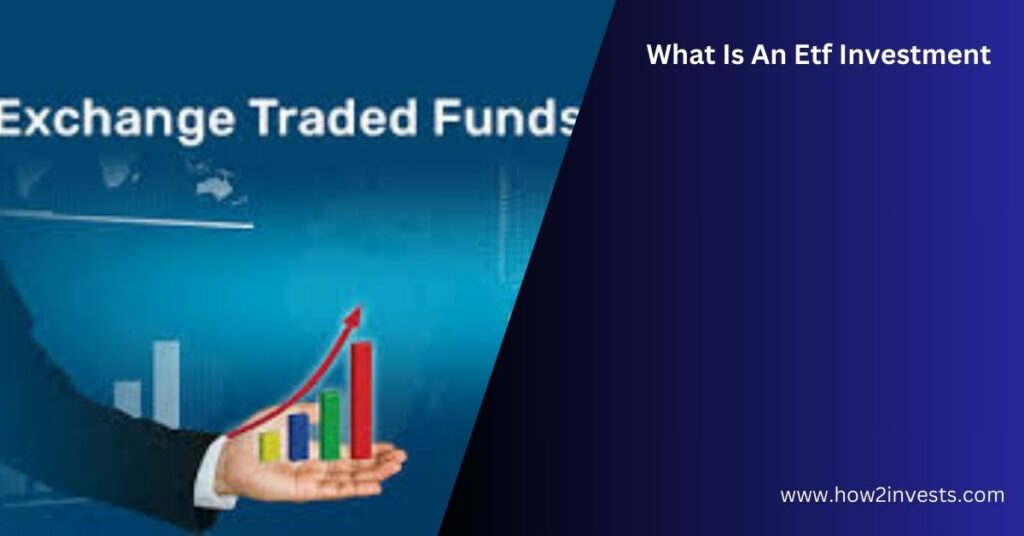What Is An Etf Investment – A Comprehensive Guide

Exchange-traded funds (ETFs) have gained immense popularity in the world of investment over the past few decades.
These financial instruments offer a unique and flexible way for individuals and institutions to invest in a wide range of assets, from stocks and bonds to commodities and more.
In this article, we will delve into the concept of ETF investments, exploring what they are, how they work, their advantages, and some considerations for potential investors.
What is an ETF?
An Exchange-Traded Fund, or ETF, is a type of investment fund and exchange-traded product with shares that represent ownership in a portfolio of assets such as stocks, bonds, commodities, or a combination thereof. ETFs are designed to offer investors diversified exposure to various asset classes while being traded on stock exchanges much like individual stocks.
How Do ETFs Work?
ETFs are structured as open-ended investment funds, which means they can create or redeem shares as necessary to accommodate investor demand.
The process involves an Authorized Participant (AP), typically large financial institutions or market makers, who work with the ETF issuer to create or redeem shares.
This mechanism helps ensure that the ETF’s market price closely tracks the net asset value (NAV) of its underlying assets.
Considerations for ETF Investors

Research: Before investing in an ETF, it’s essential to research the fund’s objectives, holdings, and historical performance. Understand what assets the ETF tracks and how they align with your investment goals.
Costs: While ETFs generally have lower expenses than mutual funds, it’s still crucial to be aware of management fees and trading costs associated with buying and selling ETF shares.
Trading Strategies: Consider your investment strategy and objectives. ETFs can be used for various strategies, including long-term investing, short-term trading, and asset allocation. Choose ETFs that align with your strategy.
Risk Tolerance: Like all investments, ETFs carry some level of risk. Assess your risk tolerance and diversify your ETF investments accordingly.
Taxes: While ETFs are tax-efficient, it’s still important to understand the tax implications of your investments and how they fit into your overall tax strategy.
Types of ETFs
ETFs come in various forms, each tailored to different investment objectives. Understanding the different types of ETFs can help you choose the ones that align with your financial goals. Some common types include:
Equity ETFs: These track a specific stock market index or a group of stocks, providing exposure to a particular sector, region, or market size.
Fixed-Income ETFs: These focus on bonds and provide investors with exposure to various types of fixed-income securities, such as government bonds, corporate bonds, or municipal bonds.
Commodity ETFs: These track the performance of commodities like gold, oil, or agricultural products, allowing investors to gain exposure to the prices of these physical assets without owning them directly.
Sector and Industry ETFs: These focus on specific sectors or industries, allowing investors to target their investments in areas they believe will outperform the broader market.
Smart Beta ETFs: These aim to outperform traditional market-cap-weighted indices by using alternative weighting strategies based on factors like dividends, volatility, or fundamental metrics.
Buying and Selling ETFs
To invest effectively in ETFs, you need to understand how to buy and sell them on the stock market. Key considerations include:
Market Orders vs. Limit Orders: Learn the difference between market orders (buy or sell at the current market price) and limit orders (buy or sell at a specific price or better) and when to use each.
Bid-Ask Spread: Understand the bid and ask prices, as the difference between them is known as the bid-ask spread, and it can affect the cost of trading an ETF.
Trading Hours: ETFs can be traded during regular stock market hours, but some may also have extended trading hours. Be aware of when you can execute your trades.
Trading Costs: Consider transaction costs such as brokerage commissions, which can impact your overall returns.
Portfolio Diversification with ETFs
Diversification is a cornerstone of sound investment strategy. ETFs offer an efficient way to build a diversified portfolio:

Asset Allocation: Determine how different ETFs can be used to create a well-balanced portfolio that aligns with your risk tolerance and investment horizon.
Rebalancing: Understand the importance of periodically rebalancing your ETF portfolio to maintain your desired asset allocation.
Risk Management: Learn how ETFs can help spread risk across different asset classes and reduce exposure to single-stock risk.
Core-Satellite Approach: Explore strategies like the core-satellite approach, where a core of broad-market ETFs is complemented with satellite positions in more specialized ETFs.
Tax Considerations and ETFs
ETFs are known for their tax efficiency, but it’s still crucial to be aware of tax implications:
Capital Gains Distributions: Understand how ETFs can minimize capital gains distributions, reducing your tax liabilities compared to some other investment vehicles.
Tax-Efficient Trading: Learn about tax-efficient trading strategies within ETFs, such as tax-loss harvesting, to optimize your tax position.
Dividend Taxation: Different ETFs may have varying dividend taxation rules, so be aware of how dividends are taxed in the ETFs you choose.
Tax-Advantaged Accounts: Consider holding ETFs in tax-advantaged accounts like IRAs or 401(k)s to maximize tax benefits and minimize tax drag on your investments.
Conclusion
Exchange-traded funds have become an integral part of the investment landscape, offering investors diversification, liquidity, cost-efficiency, and transparency.
Whether you’re a novice investor looking to start building a portfolio or an experienced trader seeking to implement specific strategies, ETFs can be a valuable addition to your investment toolbox.
However, like any investment, it’s crucial to do your due diligence, understand your goals, and consider your risk tolerance when incorporating ETFs into your financial plan.
Also Read:
- Unlocking Opportunities Käntäjää: The Translator Investment Advantage
- Unveiling the Käntäj Investment Plan: A Roadmap to Financial Success
- Kääbntäjä : A Guide to Money Investment”
- How Are Bozullhuizas Partners Ltd? Business Model, Services, and Reputation
- Unveiling the Mystery: The Enigmatic World of 2045996879




